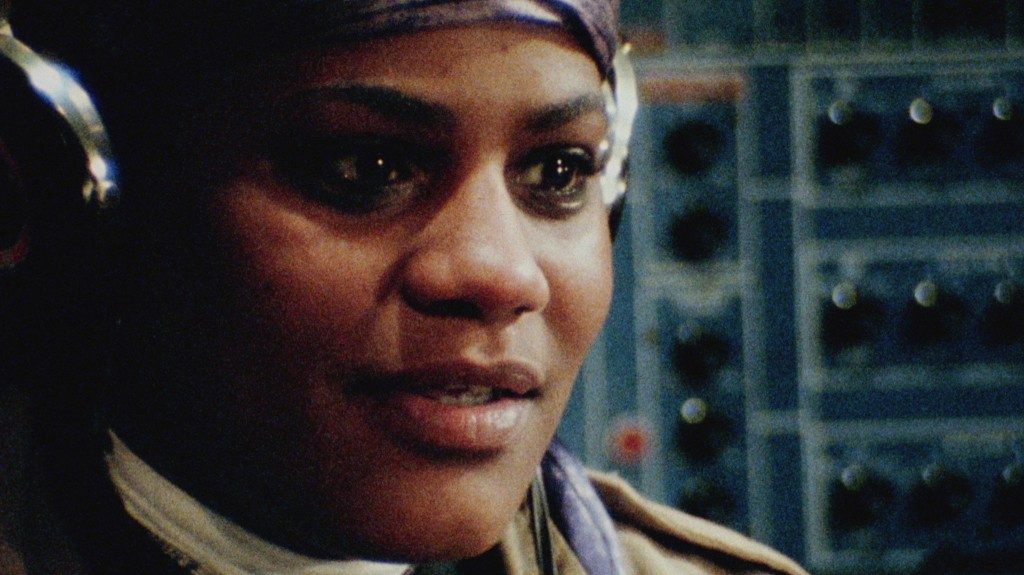Lizzie Borden is a writer-director based in Los Angeles. Her film credits include “Born in Flames” (1983), “Working Girls” (1986), and “Inside Out” (1991). Borden has directed television episodes of “Red Shoe Diaries” (1992–1997), and “The Secret World of Alex Mack” (1994–1998), and has also written pilots for Fox and Skype. Borden is currently developing the film “Rialto,” about freedom of choice, a play about Nina Simone entitled “The Queen of Shebang,” and a TV series about strippers with Antonia Crane.
“Born in Flames” will premiere at the 2016 BFI London Film Festival on October 15. The film was originally released in 1983.
W&H: Describe the film for us in your own words.
LB: “Born in Flames” is about the women who — 10 years after a social democratic cultural revolution — become revolutionaries because they are still discriminated against. Black and white women band together and fight back, ultimately by any means necessary.
W&H: What drew you to this story?
LB: In the years I was making the film — from the late ’70s to 1983 — there was massive gender, racial, and sexual discrimination, and rape, economic inequality, etc. I was angry.
W&H: What do you want people to think about when they are leaving the theater?
LB: The film ends on a question mark. I hope people will be inspired to make change. I once said I would like to rekindle hope. I still do.
W&H: What was the biggest challenge in making the film?
LB: The challenge was making the film over five years. It grew on the editing table. There was no original script, since I didn’t want to put words in the mouths of black women, especially legends like Flo Kennedy. I wanted the film to lead me. It was collaborative, not a documentary, but using some documentary techniques in a faux sci-fi, fictive world.
W&H: How did you get your film funded? Share some insights into how you got the film made.
LB: Each shoot cost about $200. I would edit new material into the ongoing cut, then gather another $200 and shoot again. I’d sub-rent my editing machine out at night for $25 a shift, I got occasional grants (thanks to D.A. Pennebaker), and would think about the subject of my following film, “Working Girls.”
W&H: What does it mean for you to have your film play at LFF?
LB: The Anthology Film Archives restored the film and created a gorgeous 35mm print — the 16mm was so low-rent. I’m grateful, too, because I remember intense debates with women’s groups when I first showed the film in London. I am curious to talk to women now.
W&H: What’s the best and worst advice you’ve received?
LB: The worst advice was to jump into a film with only a premise and no pre-existing script. If I had gone to film school, “Born in Flames” wouldn’t exist. The best advice, afterwards, was to learn how to write a screenplay.
W&H: What advice do you have for other female directors?
LB: Learn to write. Even if you are a director, you can see where the problems are.
W&H: Name your favorite woman-directed film and why.
LB: I think things are shifting to TV, so Jill Soloway and “Transparent,” because it’s not only about making something, it’s her passion, her anger, and her “re-impression” of feminism on the world, helping to wrestle it from the vilified and the fashionable. It reminds me of why I made “Born in Flames.”
W&H: Have you seen opportunities for women filmmakers increase over the last year due to the increased attention paid to the issue? If someone asked you what you thought needed to be done to get women more opportunities to direct, what would be your answer?
LB: I believe the measuring sticks are wrong — it’s not about knocking on so-called “Hollywood” doors. “They” will still only let in token numbers. But nobody is counting women’s films made globally because we’re not seeing them, at least in the U.S. — not on Netflix or Amazon.
The recent agitation for more numbers has not made a significant change in the film numbers as of current statistics. In TV, where there are more women and women have established power, things are changing. [For examples of this, look to] “Orange Is the New Black,” “Queen Sugar,” “Transparent. This is also true of independent film.
Women can change things from the ground up. Why not see this as progress, use these methods, and realize that by changing the content we can change the world, albeit slowly?







